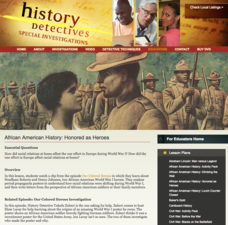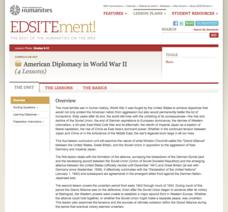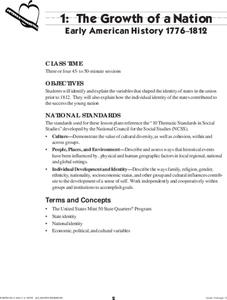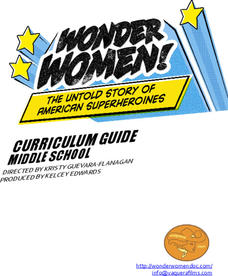PBS
African American History: Honored as Heroes
To gain an understanding of the treatment of African American soldiers during World War I, class members watch an excerpt from the History Detectives film, Our Colored Heroes, and then examine three recruitment posters from that time...
Osage County Interlocal Cooperative
Flight: 100 Years of Aviation
A 12-lesson unit traces the development of aviation from the Wright brothers flight at Kitty Hawk to Amelia Earhart's around the world journey, to Mercury 13.
School Improvement in Maryland
United States Foreign Policy
Policies of United States government which promote or fail to promote relationships with other countries—national defense, arms control, security of other nations, trade, human rights, economic sanctions, foreign aid, etc.—come under...
National Endowment for the Humanities
American Diplocmacy in World War II
The end of World War II saw the world deeply changed over the last few years. Four thorough lessons explore post-war Europe, America, and Asia through reading assignments and discussion questions about the Grand Alliance and the signing...
Heritage Foundation
Procedural Rights: Amendments VI, VII, and VIII
Even in court, your class members have procedural rights provided by the amendments. Teach high schoolers this important lesson by using the 18th installment of a 20-part unit exploring the US Constitution. The resource provides several...
Curated OER
Immigration
This 3-day immigration study draws on historical trends and current events. A worksheet accompanies initial research on one group's U.S. immigration history, giving opportunity for collaborative learning through sharing findings. Groups...
West Virginia Department of Education
The Debate - John Brown: Martyr or Madman?
Did he die for a cause, or was he crazy? Although the resource discusses John Brown and West Virginia history, many historical figures have the same reputation. Teach learners about different perspectives and highlight the importance of...
Center for Civic Education
The Power of Nonviolence: The Children's March
What was the Children's Crusade and how did it impact the civil rights movement in the United States? Your young learners will learn about this incredible event through a variety of instructional activities, from reading a poem and...
K20 LEARN
How Did We Get Here? Native Americans in the United States
High schoolers imagine what their lives would be like if they had no access to potable water and watch a morning news show about the water situation on a Navajo reservation. Groups investigate the policies that lead to the lack of water...
US Mint
The Growth of a Nation
Young historians explore the identity of the early United States in this four-part instructional activity series. Working in groups of three, students research the political, economic, and cultural atmosphere of each member of the...
Vaquera Films
Wonder Women - The Untold Story of American Superheroines: Middle School Curriculum Guide
Women in power are the focus of a three-module unit that employs comic books to bring home the importance of equality and proficient media literacy skills. In module one, scholars examine gender roles in media—boosting media literacy and...
Smithsonian Institution
The Price of Freedom: Americans at War
An interactive resource covers all of the United States' most prominent and influential historic wars including the Vietnam War, the Cold War, the War of 1812, and the Korean War. Learners observe cause and effect as well as how violence...
Center for History and New Media
A Look at Virginians During Reconstruction, 1865-1877
The transition between rebellion to reunification was not smooth after the Civil War. Young historians compare primary and secondary source documents in a study of the Reconstruction era in Virginia, noting the rights that were not...
National History Day
Why Did the United States Enter World War I in 1917?
World War I was the first major conflict on a global scale. Using primary documents, learners determine why the United States chose to enter World War I when it did. After analytical writing and group research, the causes of America's...
Advocates for Human Rights
The Rights of Women in the United States
Six diverse activities make up a substantial unit on the women's rights movement in the United States, past and present. A few of the topics at hand: the fourteenth and nineteenth amendments, the Equal Pay Act, the Lily Ledbetter Act,...
Center for Civic Education
Women's History Month Word Clouds
What a great idea for celebrating Women's History Month and discovering the amazing efforts that individuals have put forth on behalf of women's rights! Learners take a closer look at the speeches and other primary source documents of...
Curated OER
A River Ran Wild: An Environmental History
The Nashua River serves as the focal point of an investigation of the treatment of and care for natural resources. A reading of A River Rand Wild: An Environmental History by Lynne Cherry, launches the study and class members consider...
Civil War Trust
Transcribing Civil War History
Primary sources are valuable for understanding the context of historical events, but the diction and dialect in these documents can be difficult to understand. Middle and high schoolers participation in a transcription process in which...
Curated OER
Ancient Civilizations: The Ancient Israelites
Planning a study of ancient Israel and Mesopotamia (1800-500 B.C.)? Here's a resource packet loaded with activities, exercises, worksheets, and background information that integrates social studies and language arts curriculum.
Echoes & Reflections
Studying The Holocaust
While many young scholars are familiar with the Holocaust, they may not understand the specific history that led to the unprecedented atrocity. The first lesson in the unit helps teachers gauge their pupils' background knowledge. A...
iCivics
The “Supreme” in Supreme Court
Does a public school have the right to restrict what t-shirts students wear? Discover what happened when this question was brought to the Supreme Court, and review other major cases in United States history involving judicial review....
Constitutional Rights Foundation
Refugees: International Law and U.S. Policy
Discover the ways America has opened its borders to international refugees, and the ways other countries have been more or less welcoming, with an informational passage about United States and international policies on refugees. After...
School Improvement in Maryland
Are These Human Right Violations?
Using the Declaration of Human Rights and the United States Constitution as reference tools, class members examine 14 scenarios to decide if the situation represents a violation of human rights, and if these same rights are protected by...
James Madison Memorial Fellowship Foundation
Those "Other Rights:" The Constitution and Slavery
Did the United States Constitution uphold the institution of slavery, or did it help to destroy it? Young historians study Article 4, Section 2, Clause 3 of the Constitution and evaluate the rights of slaveowners as they compared to or...

























